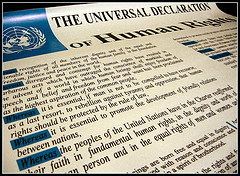UN Human Rights monitor arrives in Myanmar
 Yangon - The UN Special Rapporteur for Human Rights, Tomas Ojea Quintana, arrived in Myanmar Saturday evening, a day after two activists were given 15-year prison terms for saying the military regime did not really want democracy.
Yangon - The UN Special Rapporteur for Human Rights, Tomas Ojea Quintana, arrived in Myanmar Saturday evening, a day after two activists were given 15-year prison terms for saying the military regime did not really want democracy.
Mr Quintana wants to meet arrested opposition leader Aung San Suu Kyi and other political prisoners following a months-long spate of lengthy jail terms against scores of the military's critics ahead of a general election next year.
The opposition National League for Democracy said Saturday that two of its members, Nyi Bu and Tin Min Htut, had been punished by a closed court session Friday for sending an open letter to the UN in August critical of the military's plans to set up a civilian government.
The UN envoy Ibrahim Gambari - who visited most recently a week ago - has notably failed to induce the ruling generals to bend even slightly in the direction of compromise. Suu Kyi even refused to see Gambari on an earlier visit because she was so dissatisfied with his efforts.
Quintana will attempt during his five-day visit to persuade the regime to improve core human rights like progressively releasing "prisoners of conscience", giving independence to the judiciary, bringing its laws into line with international human rights standards and training officials to respect these rights, according to a statement released by the UN in Geneva.
He is scheduled to travel to the troubled outlying Karen state Sunday and, later, to visit the Rakhine and Kachin states, where local opposition movements have complained of multiple harassment by the authorities.
Also Friday, Tin Oo, 82, the vice-chairman of Myanmar's main opposition party, was sentenced to another year of house arrest, bringing him into his sixth year under detention under the Law Safeguarding the State from Danger and Subversive Elements, said government sources. Nobel Peace Prize laureate Suu Kyi has been kept under house arrest since May 2003 on the same charge.
Suu Kyi's attorney has been lobbying the ruling junta to release her on the grounds that her incarceration exceeds the maximum term of five years but has had no success.
It is widely believed that Myanmar's military regime wants to keep both Suu Kyi and Tin Oo out of the picture until after a general election scheduled for some time in 2010.
The NLD won the 1990 general election by a landslide, but they military has barred it from power.
Suu Kyi has spent 13 of the past 19 years under house arrest. She won the Nobel prize in 1992 for her struggle to bring democracy to her country, which has been under military rule since 1962. (dpa)